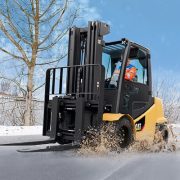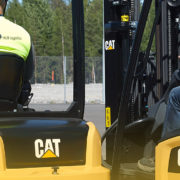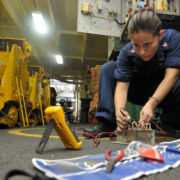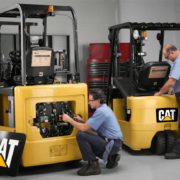At Radnes Services, we’re a family-owned company that provides forklift services across Kent, London, and Surrey. Established in 1973, we sell, rent, repair and train on how to safely operate forklift trucks. We also provide clear guidelines on why and how to maintain forklifts to ensure efficiency and longevity. In any case, a well looked after forklift is likely to serve you longer and is less likely to break down in the middle of a job, while a neglected one, on the other hand, will require replacements sooner or even put workers at risk. Let’s look closer at forklift maintenance so you can make the most of your fleet.
Inspection frequency
The inspection frequency depends on a variety of factors, including hours of operation; service record; the severity of services; past maintenance; wear and getting out of adjustment; safety requirements and age and condition. To enhance efficiency, it is important to adhere to an inspection program. The most effective way to implement these checks is to use the HSE standards which will ensure that every area of your forklift has been examined.
Daily maintenance
Daily maintenance helps to identify typical issues such as leaks or faults in breaks. Before working with a forklift, operators should visually carry out an inspection to assess the condition of the parts which are prone to damage easily. For instance, they should check the mast, radiator, engine oil, and fuel to make sure everything is in order. Tire damage is also quite common, especially if the forklift uses the same path to traverse around the warehouse. The movement causes wear and tear, which can make them deflate over time. Ensure that you check for pressure leaks or any damages that can alter the functionality of the forklift.
Monthly maintenance
Typically conducted after 200 hours of service, a monthly maintenance plan may include cleaning your forklift’s air filter element and inspecting its cap and rotator, drive belt, spark plug, and lift and tilt cylinder. During these maintenance checks, the engine can be changed, and the engine idle speed should be adjusted. It’s also worth considering lubricating the chassis and the mast components.
Quarterly maintenance
Quarterly maintenance is conducted after 600 hours of service. Some of the things that are checked here are draining the water-diesel, replacing hydraulic filters, cleaning of radiators, an inspection of the carriage rollers, hydraulic oil pump, PCV, hand brake, and mast operation.
Semi-annual maintenance
After 1200 hours of service, it is crucial that you assess the condition of the forklift by checking the brake booster operation, replacing the brake fluid, fuel filter, water separator, grease, and trucks.
Maintenance tips
Communication
Operators, technicians, and management can be reliable sources of information since they interact with the fleet more often. It is their responsibility to note down any issues regarding forklift, such as the number of repairs, parts that have been replaced, and repairs that are covered by insurance or warranty. Through such information, one can assess the expenses vis-à-vis profits to determine which changes need to be made.
Cleaning
This is an important part of maintenance since only through cleaning can you identify some problems, such as blocked radiators. Besides improving the aesthetic appearance of the forklift, cleaning helps in getting rid of combustible materials and other foreign material that hinder the operation of the machine. Enforce weekly cleaning where you can remove any dirt and mud on the forklift, blow the radiators, and change filters. By sticking to a regular cleaning schedule, you are sure to keep your forklift safe, efficient, and more importantly, you will not have to use a lot of money replacing items now and then.
Deal with issues immediately
In the course of operating a forklift, you are likely to foresee a problem even before it manifests. For example, you can notice when the clutch becomes too soft or tines break in the middle of work. It is recommendable that you deal with such issues before they escalate to costly repairs or accidents. Encourage employees to report any minor issues so that they are taken care of promptly. Additionally, be keen to notice any strange sounds or leaks which might be an indication that a forklift needs attention.
Inspections
Due to the risks involved with forklifts, just like all other machinery, it is recommendable that inspections are done by qualified technicians, preferably those with the required certification. In the same vein, forklifts should only be deemed fit to work when a qualified person says so.
Sign up for a plan
Signing up for a comprehensive maintenance plan with a reputable company can save you the trouble of worrying about the state of your forklifts. Such companies take responsibility for cleaning, repairing, and replacing worn-out parts, meaning you don’t have to invest a lot of time following up on it. You can also be assured that your forklifts are being attended to by experienced technicians since the company will work to keep the standards of work as high as possible.
Check safety features
Safety features, including turn and back signals, are essential in ensuring safety and preventing accidents from happening. Moreover, they are part of the requirements of HSE, which means that failure to observe standards in this regard can put you in legal and financial problems.
Check hoses
Do not ignore a leaky hose, no matter how small it might appear, as it will only get worse with time. Moreover, leaks pose more harm to employees who may slip on the oil and hurt themselves. If not sure of how to go about a leak, one should consult the manual or report to the supervisor immediately.
Tyre pressure
Forklift maintenance begins from the tyres. Tires with improper pressure can lead to load shift and accidents that might result from falling loads. Typically, one should keep the pressure at or just below the recommended PSI rating. However, this depends on the current weather; in cold weathers, one should keep full pressure while in warm weathers, one should aim to keep the pressure below PSI since air inside is expected to expand due to hot air.
Read the manual
It is only through reading the manual that you can get acquainted with how to maintain a forklift properly. Every industrial truck comes with a detailed and comprehensive manual which every operator should take upon himself to understand its contents. Accordingly, you will be in a better position to ensure a safe workplace for all.
Why you need to maintain your forklift
Preventing accidents
Most accidents caused by a forklift are attributed to lack of maintenance. For instance, some operators do not concern themselves with checking the conditions of the tires or radiators which, due to neglect, get worn out and ineffective. A well-maintained forklift is not likely to cause accidents since everything is functioning how it is supposed to.
Overall safety
This includes a combination of well-trained drivers and forklifts that are functioning correctly. Properly maintained forklifts are easy to use and not likely to put the lives of workers at risk. In any case, ensuring safety in the workplace should be a culture that people adopt for their own good.
HSE requirements
HSE’s only role is to enforce safety, and they have a specific guide on how one can achieve that in their specific industry. Forklift operators are expected to observe these requirements or else be liable for fines. To avoid all the unnecessary costs you are likely to incur if you are caught breaking the rules, just ensure your forklifts are always taken care of at all times.
Ensure efficiency
With a well-functioning forklift, you can work faster and with ease as opposed to working with a faulty one. Consequently, you are bound to realise more productivity. Doing a lot of work within a short timeframe can guarantee you better returns since you are maximising on the resources you have. As mentioned here, learn to regularly check some of the parts that tend to wear out faster (such as brakes, tires, and radiators) as this can adversely affect operations.
Preventing sudden failure
Forklifts are used to lift heavy objects around a warehouse. Since they carry heavy equipment, they are bound to wear and tear, and as such, they can cause accidents. Masts and tires are more exposed to pressure and therefore are more likely to tear, as such, they need more attention. When repairs are done on a regular schedule, accidents can be avoided.
Reducing the costs of repair
Preventative maintenance helps to identify potential damages on a forklift which prompt immediate repairs depending on their nature. One can save costs significantly, for example by repairing a leaking hydraulic pump, rather than waiting until it has to be replaced with a new one. One problem can lead to another, and you might be surprised by how much damage is done by the time you decide to look into an issue that you ignored when you first noticed it.
Identifying forklifts that should be cycled out
It is in the course of maintenance that you have the biggest opportunity to notice which forklifts are worn out and are no longer efficient as part of the fleet. You can weigh the cost of repair and maintenance versus the cost of buying a new forklift to decide whether it is time to cycle out the old ones.
In conclusion, forklift maintenance aims at increasing forklift efficiency and safeguarding the safety of the operators and other workers. Failure to observe safety regulations, for example, through neglect, can have negative consequences on your operations. It is therefore important that you observe the rules to avoid incurring costs which result from this.
Why not get in touch with the Radnes Services team to find out more about how to best maintain your forklift fleet?







